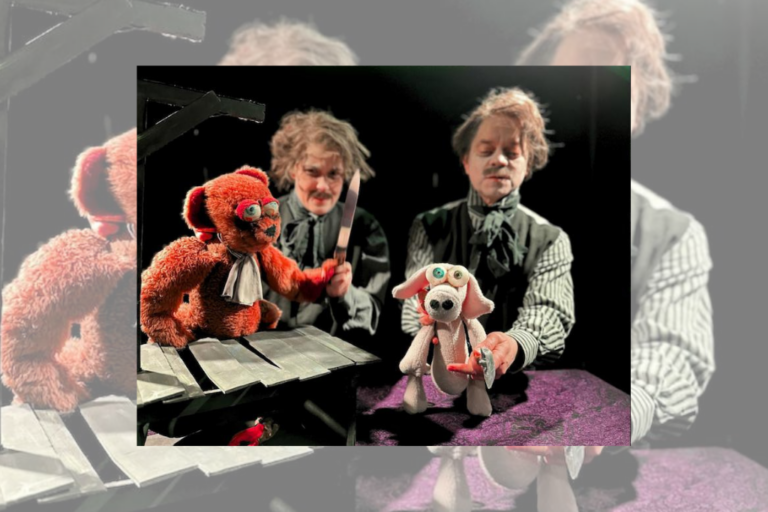REVIEW: A Case for the Existence of God makes meaning of platonic intimacy
There are no miracles in Samuel D. Hunter’s A Case For the Existence of God, the 2022 two-hander about male friendship and single fatherhood currently playing at Coal Mine Theatre. Nor is there a great deal of theology, or more than a passing nod to religion.
What there is, instead, is a breathtaking amount of quiet understanding and decency in its characters’ mix of naked dread for and fervent faith in the future. By finding the grace notes in a sharing of similar sadness, Hunter creates a hopeful harmony in a minor key.
When Ryan (Noah Reid) meets mortgage broker Keith (Mazin Elsadig) at daycare pickup in their home town of Twin Falls, Idaho, he sees the other man as a lifeline, asking him to help secure a loan to purchase a plot of land where his ancestors once lived. Freshly divorced, dairy factory worker Ryan is fighting to retain partial custody of his toddler. His friendly, garrulous veneer, battered by life, cracks surprisingly easily and often. The fissures reveal stories about his family’s consuming battle with depression-fuelled addiction and his hope that his daughter’s inheritance will be their land, rather than their struggles with mental illness.
Tattooed on his arms, the outlines of Ryan’s home state and his daughter’s name (courtesy of costume designer Des’ree Gray) signify his desperate attempt to hang on to the last features of stability in his life, along with the wedding ring that he never mentions, but also never removes.
While Keith’s life seems more stable, his grasp on fatherhood is even more tenuous; as a gay Black single dad, he’s been through years of cancelled adoptions, and his foster-to-adopt daughter’s biological family may still successfully petition for her return. Keith latches on to Ryan’s difficult case, which distracts him from his own anxieties; never fully contained, they manifest in a Pavlovian response to every phone alert, Elsadig anticipatorily tensing with Keith’s fear for the worst.
The men form an odd-couple friendship, slipping briskly into a life-changing platonic intimacy. Elsadig and Reid also fully slip into their characters, making them feel real and sympathetic in their quirks and imperfections. Reid’s Ryan has a goofy affability to him as he admits his financial illiteracy or offers his lonely friend well-meaning but awkward dating suggestions.
Ryan’s confidence of getting a loan on strength of character alone would be insufferable if he radiated even a hint of guile; instead, Reid leans into the character’s sweetness and willingness to step outside his comfort zone. Keith’s easy use of university-level vocabulary leaves Ryan baffled but intrigued, repeating the unfamiliar words like he’s savouring a new taste; he similarly samples his more worldly friend’s whiskey as they watch television with a collective ear towards Keith’s baby monitor.
Where Reid languidly sprawls outward, Elsadig is coiled, drawn inward in self-protection with the guardedness of a man whose identity makes him a target. It’s gratifying to watch him occasionally leave his shell; when Keith talks about his childhood travels or his degree in Early Music, his nervous intensity becomes wonderment. As he teaches Ryan about the origins of polyphony, the metaphor rings clear: We used to sing a single melody, but once we began to harmonize, there was no turning back.
Director Ted Dykstra’s equally harmonious transitions occur seamlessly during moments of dialogue, making the evolving relationship fly by. Even though Nick Blais’ deliberately generic brokerage set always remains in the background, it’s clear whether we’re at work or on the playground. Strangely, the only moment that feels static is during the emotionally moving but slightly detached ending. Seen over the flowing sands of an abstracted hourglass, it’s a daring temporal departure that works more conceptually than as staged.
A Case For the Existence of God briefly examines questions of privilege, the hardships of growing up gay and Black but in a loving, middle-class household contrasted with a childhood of straightness and whiteness, but also poverty and addiction. It’s not a full-fledged analysis, just a reminder that, like a bank’s mortgage calculations, “running the numbers” on a person’s identity doesn’t fully encapsulate who that person is. Mostly, the play’s urgency and strength come from the gentle way it presents male vulnerability and platonic intimacy — for lack of which men may burn themselves, or the rest of us, to the ground.
Keith and Ryan gaze at their daughters sharing space on a playground made much safer since their own childhoods. As Keith fumbles with his phone, trying to snap the perfect shot, Ryan crows that their children are, for the first time, holding hands “like persons.” It’s in the simple act of reaching out to another, Hunter’s play says, that we become whole.
A Case for the Existence of God runs at Coal Mine Theatre until December 1. Tickets are available here.
Intermission reviews are independent and unrelated to Intermission’s partnered content. Learn more about Intermission’s partnership model here.













Comments